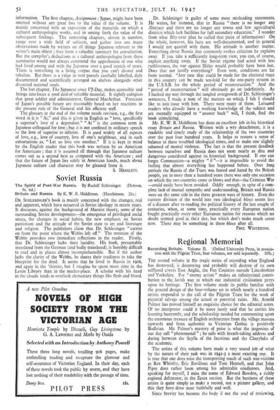Soviet Russia
Britain and Russia. By K. W. B. Middleton. (Hutchinson. 21s.)
DR. SCHLESINGER'S book is mainly concerned with the changes, real and apparent, which have occurred in Soviet ideology in recent years. It discusses, against the background of Marxist theory, some of the outstanding Soviet developments—the emergence of privileged social strata, the changes in social habits, the new emphasis on Soviet patriotism and the attitude of the Soviet state to art and literature and religion. The publishers claim that Dr. Schlesinger "carries on from the point where the Webbs left off." The mention of the Webbs provokes two immediate reflections in the reader. Firstly, that Dr. Schlesinger lacks their lucidity. His book, presumably translated from the German (and badly translated), is horribly difficult to read and in places almost incomprehensible. But if the author lacks the clarity of the Webbs, he shares their readiness to take the blueprint for the deed. It seems that he lived in Russia in 1926, and again in the 'thirties, but I imagine he spent more time in the Lenin Library than in the market-place. A scholar with his head in the clouds tends to overlook elementary things like flesh and blood. Dr. Schlesinger is guilty of some most misleading statements. He writes, for instance, that in Russia " there is no longer any illiteracy and there are no longer any towns and few agricultural districts which lack facilities for full secondary education." I wonder from what fifty-year plan he culled that piece of information! On the whole, however, his facts are well-documented, and in general I would not quarrel with them. His attitude is another matter. Everything about Russia that commonly evokes criticism he explains away. If you take a sufficiently long-term view, you 'can, of course, explain anything away. If the Soviet regime had acted with less ruthlessness, the war against Hitler would probably have been lost. Does that not justify everything? Even now, conditions are far from normal. "Any case that could be made for the electoral truce in this country can be made ten-fold for the one-party system in the U.S.S.R. for the whole period of reconstruction." And the " period of reconstruction " will obviously go on indefinitely. As I hacked my way through the tangled overgrowth of Dr. Schlesinger's sentences, I made a note of the matters on which I felt I should like to join issue with him. There were many of them. Leisured readers who already have a working knowledge of the subject and are mentally equipped to " answer back " will, I think, find the book stimulating.
Mr. K. W. B. Middleton has done an excellent job in his historical essay Britain and Russia. Written with a wry detachment, it is a readable and timely study of the relationship of the two countries over the past four hundred years. It helps to restore a sense of balance in these troubled ideological times, and to make one slightly ashamed of mental violence. The fact is that the present deadlock between ourselves and Russia does not seem nearly as dire and dangerous considered against its historical background. If one can forget Communism—a mighty " if "—it is impossible to avoid the feeling that almost everything has happened before. Over long periods the Russia of the Tsars was feared and hated by the British people, yet in more than a hundred years there was'only one occasion on which the two countries came to blows and that—the Crimean War —could easily have been avoided. Oddly enough, in spite of a com- plete lack of mutual sympathy and understanding, Britain and Russia were on the same side in the three greatest wars of history. Even the current division of the world into two ideological blocs seems less of a disaster after re-reading the political history of the last couple of centuries, when, at some time, practically every European nation fought practically every other European nation for reasons which no doubt seemed good in their day, but which don't make much sense now. There may be something in these blocs after all.
PAUL WINTERTON.


































 Previous page
Previous page